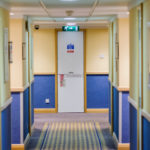In the year after the Building Safety Act became law, awareness of the benefits of fire door third-party certification is growing, but the proportion of certified fire doors in use has dropped slightly, new research for the British Woodworking Federation (BWF) Fire Door Alliance has shown.
The survey of 1,000 people with responsibility for fire door specification, installation, and maintenance across the UK found that over half (52%) now look for third-party certification — as opposed to other means — to provide proof of performance for a fire door. This was higher than the 46% in 2022 when the same audience was surveyed.
Two thirds (66%) said they’re more likely to seek certification as a consequence of the Building Safety Act, and 92% now said that the traceability of a complete fire door assembly is important, compared to 89% in 2022. These attitudes could indicate that new legislation aimed at increasing accountability is starting to take effect.
Despite the growing awareness of third-party certification, and greater intention to specify third-party certified fire doors evidenced by these figures, this hasn’t yet translated to higher uptake. In fact, whereas in 2022 respondents said that 56% of the total number of fire doors they are responsible for are third-party certified, this figure, concerningly, was lower at 54% in 2023’s survey.
 Helen Hewitt, Chief Executive of the BWF Fire Door Alliance, said: “It’s clear that new legislation is having an effect on attitudes towards traceability and accountability in fire safety, which is hugely positive to see. For fire doors specifically, we’re seeing a greater understanding of the benefits that third-party certification can deliver in aligning with the intention of new legislation.
Helen Hewitt, Chief Executive of the BWF Fire Door Alliance, said: “It’s clear that new legislation is having an effect on attitudes towards traceability and accountability in fire safety, which is hugely positive to see. For fire doors specifically, we’re seeing a greater understanding of the benefits that third-party certification can deliver in aligning with the intention of new legislation.
“However, the findings highlighted a disconnect between greater awareness and intent, and the number of third-party certified fire doors being specified. This is concerning and highlights that more guidance and training support is needed to increase uptake. We do anticipate that as legislation leads to more robust systems over traceability, we will see increased demand for third-party certification. Certification provides robust proof of performance and traceability of a fire door’s components, its manufacture and journey through the supply chain. As such, it is a ready-made solution for complying with new regulations.”
While the impact of legislation over attitudes and intent appears to be significant, the research also highlighted areas where further education and guidance is needed over implementing the new laws.
Some 30% of respondents were unsure or did not understand their responsibility with regards to the new legislation and pointed to the need for more support.
Despite 78% having read new fire safety documents published by the Home Office to assist the Responsible Person in fulfilling their obligations, a third (33%) said more information from the Government would improve their understanding of their responsibilities. Not all guidance is expected to come from the government however; 39% wanted more input from employers and 55% said they needed better training support.
Helen Hewitt added: “The Building Safety Act is still in its relative infancy and it’s natural that there’s an adjustment period in meeting requirements. The onus isn’t just on organisations or individuals themselves to comply, but it also requires the Government, employers and the fire and building safety industry to continue to provide education and support in navigating these major changes. Only by doing this can we make our buildings safer for all.”
For more information visit https://firedoors.bwf.org.uk/










